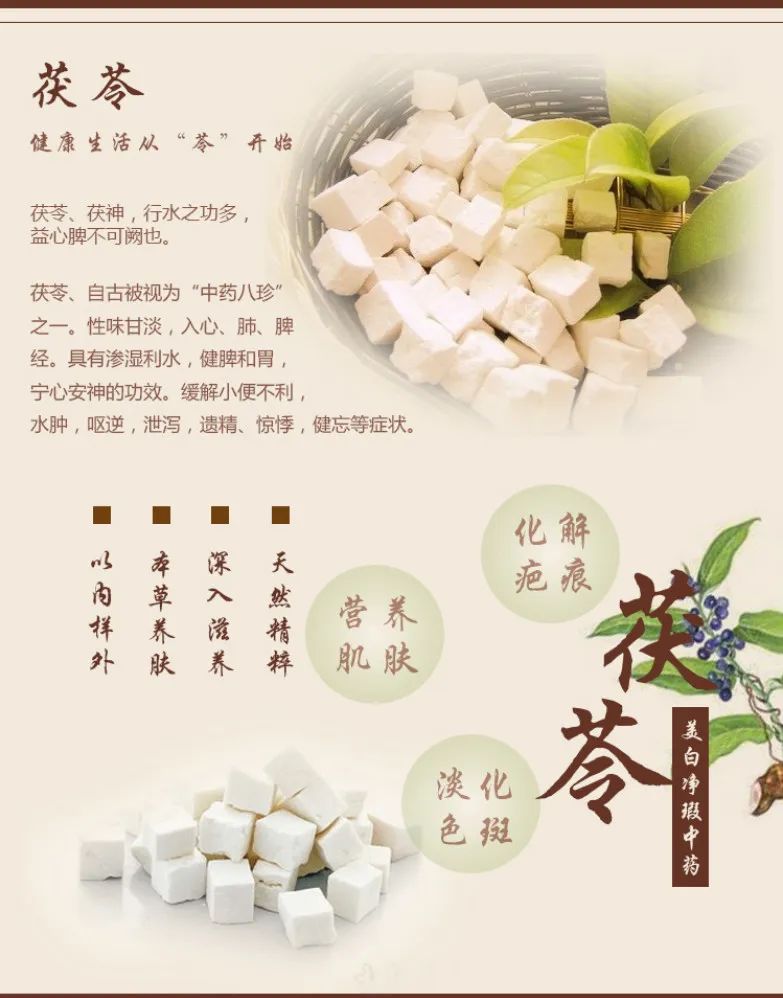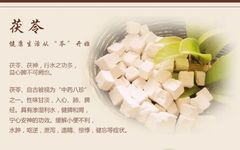The Efficacy and Indications of Poria (Fu Ling)
1. It is used for patients with gastrointestinal symptoms, primarily for functional dyspepsia or those suffering from chronic diarrhea. Long-term use of Poria can significantly improve symptoms of diarrhea. Additionally, it strengthens the spleen and resolves dampness, thereby enhancing the patient’s appetite.
2. It is indicated for urinary system diseases, such as chronic renal failure, where edema and reduced urination occur. Poria can be used to promote diuresis and reduce swelling.
3. It is beneficial for Meniere’s syndrome or symptoms of dizziness and palpitations.
4. It is also used for certain psychological symptoms, such as restlessness, insomnia, and palpitations. Poria has a calming effect on the mind and can improve sleep quality. Poria is sweet in flavor and neutral in nature, primarily entering the spleen, lung, and large intestine meridians.

Contraindications and Side Effects of Poria
Contraindications of Poria:
1. Overconsumption is not advisable. Poria has diuretic properties, and excessive intake can lead to frequent urination, which may harm the body’s fundamental essence and deplete vital energy.
2. Diabetic patients should use caution. Poria contains a high starch content, and excessive consumption may lead to elevated blood sugar levels.
3. Individuals with dry throat should avoid Poria. As Poria promotes diuresis and dampness elimination, it can exacerbate dehydration symptoms in those with dry throat.
4. Patients with kidney deficiency should not use Poria. Those with kidney deficiency already experience frequent urination, and Poria’s diuretic effect may worsen this condition.
Side Effects of Poria:
1. Dry mouth: Patients with a weak constitution or kidney deficiency may experience dry mouth and tongue after taking Poria, potentially worsening kidney deficiency symptoms.
2. Frequent urination: Poria is the dried sclerotium of the fungus Poria cocos, which is sweet and bland in taste and neutral in nature; it enters the heart, lung, spleen, and kidney meridians. It has diuretic, swelling-reducing, dampness-eliminating, spleen-strengthening, and calming effects. Clinically, it is often used to treat edema, spleen deficiency diarrhea, palpitations, and insomnia. If patients exceed the recommended dosage, they may experience increased urination.
3. Gastrointestinal discomfort: As with any medication, it is crucial to follow a doctor’s guidance. Unauthorized use of Poria may irritate the gastric mucosa, increasing the burden on the gastrointestinal tract and potentially causing nausea, vomiting, abdominal pain, and bloating.
What Not to Eat with Poria:
1. Most food ingredients can be consumed with Poria, and combining them can enhance nutrient absorption and improve Poria’s health benefits. However, it is essential to monitor the dosage, as excessive intake can burden the body and hinder its health benefits.
2. Poria should not be consumed with tea, especially strong tea, as the various nutrients in strong tea can destroy the effective nutrients in Poria, leading to nutrient loss and the formation of harmful substances that may adversely affect health.
3. While there are no specific foods that conflict with Poria, individuals with a weak constitution or those who are physically cold or have sinking Qi should avoid it, as it may exacerbate their discomfort and hinder health maintenance.
4. Poria is suitable for most people, especially those with restlessness and frequent insomnia, as it can significantly improve these symptoms. Additionally, those with spleen and stomach deficiency, loose stools, and edema can also experience notable health benefits from consuming Poria.

